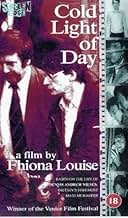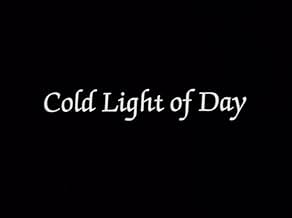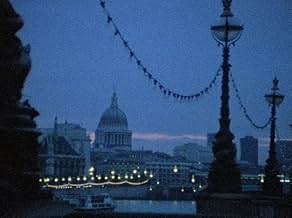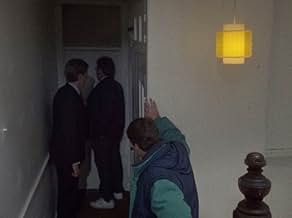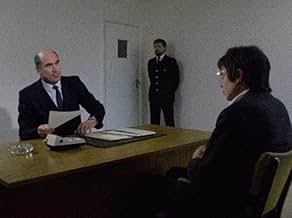Sigue la historia ficticia basada en las acciones del asesino en serie Dennis Nilsen.Sigue la historia ficticia basada en las acciones del asesino en serie Dennis Nilsen.Sigue la historia ficticia basada en las acciones del asesino en serie Dennis Nilsen.
- Dirección
- Guión
- Reparto principal
- Premios
- 1 premio en total
Eugene Cheese
- Grandfather
- (as Paul Jay)
Louis Haslar
- Rent Boy
- (as Louis Hasler)
Reseñas destacadas
If you are reading this you will have come here with a purpose. The sadistic trail of murderous narcissism left behind by Dennis Nilsen from 1978 until being caught in 1983 will be familiar.
This low budget retelling, in the style of a reject Channel 4 documentary, disappoints on several levels. The production could have been much more effective as a Film Noir. Narrative should drive the action which takes place in the shadows. Much more should have been made of conceptual imagery. The long, wandering take of Nilsen's room that concludes the film hints at what is possible.
One of the first ideas drummed into fledgling film editors is that sound is king. People will forgive the occasional wobble or slip in focus, even a dreadful edit, but will only endure a few moments of poor sound. From the opening whirl and deafening whoosh of whistling wind underpinned with rhythmic thumps, through the oh so too long tolling funeral bell complete with Darth Vader breathing, to the invasive wild-takes in street scenes, the soundtrack is jarring.
The action of the film, concerning the enticement of the victims, their strangulation and drowning, followed by their dismemberment and disposal, is interspersed with sections of the police interview after arrest. My reading of the notes taken at the time, this was before PACE and the routine tape recording of interviews, along with the subsequent evidence at trial, portrays a civil interrogation of a compliant, emotionless Nilsen, calmly admitting to his crimes. In Fhiona Louise's version here we have the lead detective, Chief Inspector Simmons (Geoffrey Greenhill), in real life DCI Peter Jay, railing and shouting with his suspect, trying to obtain admissions of perversion and worse.
The Nilsen character is played by Bob Flag, bearing an uncanny resemblance to the murderer. For the film he is renamed Jorden March, possibly a nod to Whitemoor prison where, for a while, he was held.
If you know nothing about this case then pass this one by. If you are knowledgeable then you will find nothing new here except interpretation. If you are looking for a low budget, amateurish, short to deconstruct then you have hit the jackpot.
This low budget retelling, in the style of a reject Channel 4 documentary, disappoints on several levels. The production could have been much more effective as a Film Noir. Narrative should drive the action which takes place in the shadows. Much more should have been made of conceptual imagery. The long, wandering take of Nilsen's room that concludes the film hints at what is possible.
One of the first ideas drummed into fledgling film editors is that sound is king. People will forgive the occasional wobble or slip in focus, even a dreadful edit, but will only endure a few moments of poor sound. From the opening whirl and deafening whoosh of whistling wind underpinned with rhythmic thumps, through the oh so too long tolling funeral bell complete with Darth Vader breathing, to the invasive wild-takes in street scenes, the soundtrack is jarring.
The action of the film, concerning the enticement of the victims, their strangulation and drowning, followed by their dismemberment and disposal, is interspersed with sections of the police interview after arrest. My reading of the notes taken at the time, this was before PACE and the routine tape recording of interviews, along with the subsequent evidence at trial, portrays a civil interrogation of a compliant, emotionless Nilsen, calmly admitting to his crimes. In Fhiona Louise's version here we have the lead detective, Chief Inspector Simmons (Geoffrey Greenhill), in real life DCI Peter Jay, railing and shouting with his suspect, trying to obtain admissions of perversion and worse.
The Nilsen character is played by Bob Flag, bearing an uncanny resemblance to the murderer. For the film he is renamed Jorden March, possibly a nod to Whitemoor prison where, for a while, he was held.
If you know nothing about this case then pass this one by. If you are knowledgeable then you will find nothing new here except interpretation. If you are looking for a low budget, amateurish, short to deconstruct then you have hit the jackpot.
Produced by, and with strong ties (no pun intended!) to "Britain's worst director" (and convicted fraudster) Richard Driscoll, this film, which I first saw near its original release in the 90s, has curiously been resurrected from cinema's dustbin for a recent Blu-ray.
Booed off the screen (literally!) upon its limited release in 1990, this fictionalised 'true story' of the Dennis Nilsen serial killer case from north London in the early 80s is told with zero subtlety or respect. Massively re-adjusting events (for titillation, I'm guessing. For example, 'Nilsen' visits a female prostitute - something which never happened and only seems an excuse to show crude T&A) and the barely-a-feature film includes an insulting, confusing end caption.
It's hard to say what director Fhiona Louise (sometimes styled as Fhiona-Louise -- which is it?!) intended, but the stodgy dialogue and delivery has Driscoll written all over (see, or really don't, any of his other epics like The Comic or Kannibal) and the filmmaking looks like something unsure film students would do, complete with awkward camera half-moves and bit-parters delivering unintentional comedy (a senile neighbour shuffles back to his room like it's a comedy-act and we get lines like "oh s**t!" about a blocked toilet uttered with zero self-awareness).
The whole film only succeeds in capturing the grim reality of Bedsitland at the time (purely by coincidence as many parts of the now gentrified North London were still like that at the time), becoming a period piece in a way.
Ultimately though, it has nothing to say, no care for the victims and generally seems concocted as a quick cash-grab.
Ironically (or why it was rereleased when nobody was asking for it?), a big budget ITV dramatisation of the Nilsen case was also shown in 2020, the same year as Arrow's Blu-ray Special Edition. Unlike Cold Light of Day, it decided to avoid all of the gruesome aspects and position itself as a generic detective drama with a smattering of stock-footage for confusing context.
Those wishing to find out more about the real case are better off seeking out the thorough book Killing for Company.
There's also a BBC Two short film from the late 80s called (viewable on YouTube) called The Monochrome Man which says far more - with much greater assuredness and panache - than this amateurish film ever could.
Booed off the screen (literally!) upon its limited release in 1990, this fictionalised 'true story' of the Dennis Nilsen serial killer case from north London in the early 80s is told with zero subtlety or respect. Massively re-adjusting events (for titillation, I'm guessing. For example, 'Nilsen' visits a female prostitute - something which never happened and only seems an excuse to show crude T&A) and the barely-a-feature film includes an insulting, confusing end caption.
It's hard to say what director Fhiona Louise (sometimes styled as Fhiona-Louise -- which is it?!) intended, but the stodgy dialogue and delivery has Driscoll written all over (see, or really don't, any of his other epics like The Comic or Kannibal) and the filmmaking looks like something unsure film students would do, complete with awkward camera half-moves and bit-parters delivering unintentional comedy (a senile neighbour shuffles back to his room like it's a comedy-act and we get lines like "oh s**t!" about a blocked toilet uttered with zero self-awareness).
The whole film only succeeds in capturing the grim reality of Bedsitland at the time (purely by coincidence as many parts of the now gentrified North London were still like that at the time), becoming a period piece in a way.
Ultimately though, it has nothing to say, no care for the victims and generally seems concocted as a quick cash-grab.
Ironically (or why it was rereleased when nobody was asking for it?), a big budget ITV dramatisation of the Nilsen case was also shown in 2020, the same year as Arrow's Blu-ray Special Edition. Unlike Cold Light of Day, it decided to avoid all of the gruesome aspects and position itself as a generic detective drama with a smattering of stock-footage for confusing context.
Those wishing to find out more about the real case are better off seeking out the thorough book Killing for Company.
There's also a BBC Two short film from the late 80s called (viewable on YouTube) called The Monochrome Man which says far more - with much greater assuredness and panache - than this amateurish film ever could.
One has to admire the balls it took to make this movie. For a start, the atmosphere is cloying and intense, and if you've taken the time to track this movie down then chances are you probably know a little bit about it. Based on the crimes of British serial Killer Dennis Nielson, cold light of day is a slice of docu-drama little like anything you've ever seen before. i saw this on video in its 75 minute entirety, and it is a difficult movie to sit through. It makes you feel so uncomfortable, and tries, in its own way to present its characters with some compassion, but they are all so cold and pathetic that you squirm in your seat and wait for it to end. It took me a long time to track this little gem down, and it has had a couple of releases in the UK throughout the 1990's, but its a hard film to watch. Certainly a must for serial killer movie buffs or anyone interested in lensing their first movie, cold light of day is awkward and, in several places, downright unpleasant. Henry Portrait of a serial killer was gruesome, Cold Light of Day is a shiver than runs down your spine in the dead of night.
"Cold Light Of Day" is more of a dramatisation than a film; fairly short, it explores the psychology of one of modern Britain's monsters. Dennis Nilsen murdered twelve, possibly more, young men, purely for his own gratification. A necrophiliac as well as a sexual sadist, his fascination with death is believed to have sprung from the death of his grandfather, that is if we can believe anything he said.
We see flashbacks to his boyhood but the film concentrates on his picking up his victims and murdering them. There is also an attempt to humanise him by showing his acts of kindness to an elderly neighbour. To which the best reply is so what? Ted Bundy actually worked on a suicide prevention helpline.
The names have been changed, which is understandable for victims and incidental characters, but was it necessary to change Nilsen's name to Jorden March? Lead actor Bob Flag bears a striking resemblance to Nilsen - hopefully only a physical one! - and it is easy to see why this ultra-low budget effort picked up a prize at the 1990 Venice Film Festival.
We see flashbacks to his boyhood but the film concentrates on his picking up his victims and murdering them. There is also an attempt to humanise him by showing his acts of kindness to an elderly neighbour. To which the best reply is so what? Ted Bundy actually worked on a suicide prevention helpline.
The names have been changed, which is understandable for victims and incidental characters, but was it necessary to change Nilsen's name to Jorden March? Lead actor Bob Flag bears a striking resemblance to Nilsen - hopefully only a physical one! - and it is easy to see why this ultra-low budget effort picked up a prize at the 1990 Venice Film Festival.
This is what they sometimes call a 'docu-drama,' which never really cuts it for me, it's either a documentary or a drama and never shall the twain meet. It just doesn't work as either in the end.
It tries for realism as a documentary with the everyday scenes meeting young rootless men in dingy cafés for the promise of a bed,food,drink and casual gay sex. And tries for dramatic scenes with the murders and the ensuing aftermath. But really works as neither as both parts come across as dull and boring. Perhaps most killers are as uninteresting as this and maybe that is the point the film is trying to make. Sadly it doesn't make it very entertaining
The pounding background music intended to heighten tension at crucial moments just grates and doesn't help at all. I was going to say that some editing and cutting would have made the whole thing move faster and have increased the overall pace of the film. But then I noticed on the general information about this film that a 32 minute version was released in the cinemas. I've watched the much longer video version.
As a film about killer, Dennis Nilsen, called Gordon Marsh in the film for what I assume was copyright reasons at the time of it's original release, it just doesn't engage the attention or make us understand anything about the character and his motives.
Other documentaries have been made since about Nilsen that delved deeper and are more interesting and they would be better to search out and watch instead.
It tries for realism as a documentary with the everyday scenes meeting young rootless men in dingy cafés for the promise of a bed,food,drink and casual gay sex. And tries for dramatic scenes with the murders and the ensuing aftermath. But really works as neither as both parts come across as dull and boring. Perhaps most killers are as uninteresting as this and maybe that is the point the film is trying to make. Sadly it doesn't make it very entertaining
The pounding background music intended to heighten tension at crucial moments just grates and doesn't help at all. I was going to say that some editing and cutting would have made the whole thing move faster and have increased the overall pace of the film. But then I noticed on the general information about this film that a 32 minute version was released in the cinemas. I've watched the much longer video version.
As a film about killer, Dennis Nilsen, called Gordon Marsh in the film for what I assume was copyright reasons at the time of it's original release, it just doesn't engage the attention or make us understand anything about the character and his motives.
Other documentaries have been made since about Nilsen that delved deeper and are more interesting and they would be better to search out and watch instead.
¿Sabías que...?
- CuriosidadesClaire King has a small role in this film as a Prostitute who is better known as Kim Tate in popular UK Drama Emmerdale.
- PifiasIn the end credits, the word 'prosthetics' is misspelled 'prosphetics'.
- Créditos adicionalesBefore the end credits, a caption appears that reads 'For those too sensitive for this world - Fhiona'.
- ConexionesReferenced in Film Junk Podcast: Episode 905: Talk to Me + Extra Terrestrial Visitors (2023)
Selecciones populares
Inicia sesión para calificar y añadir a tu lista para recibir recomendaciones personalizadas
- How long is Cold Light of Day?Con tecnología de Alexa
Detalles
- Duración1 hora 20 minutos
- Color
- Relación de aspecto
- 1.37 : 1
Contribuir a esta página
Sugerir un cambio o añadir el contenido que falta

Principal laguna de datos
What is the French language plot outline for Cold Light of Day (1990)?
Responde
